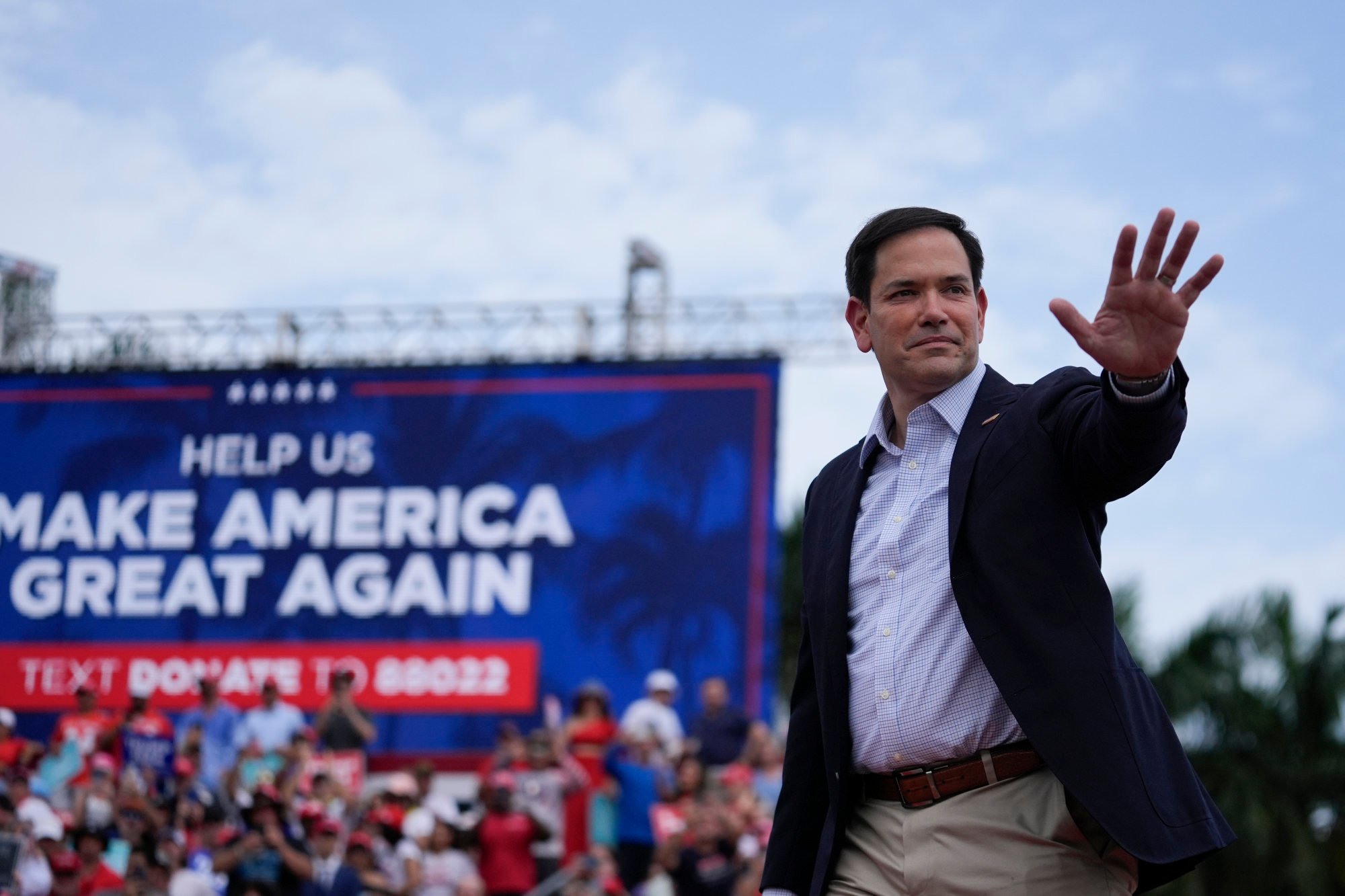“Today is the day – get out and vote,” Donald Trump urged in a November 5 message on TikTok, a highly popular social-media platform whose controversial impending ban lays bare an underlying Sino-American tension since the Republican’s first presidency.
Although Trump has yet to post on his personal TikTok account since winning the election, he turned to the video app during his campaign to engage young Americans. Nearly 30 per cent of TikTok’s 170 million US-based users are between 25 and 34 years old.
“I am gonna save TikTok,” Trump promised in a June post that got more than 8 million likes. Currently the president-elect has more than 14 million followers on the platform.
Do you have questions about the biggest topics and trends from around the world? Get the answers with SCMP Knowledge, our new platform of curated content with explainers, FAQs, analyses and infographics brought to you by our award-winning team.
In the two months between now and US Inauguration Day and amid substantial unease in Washington about data security, a question looms: can Trump indeed save TikTok?
Trump, both as a 2024 presidential candidate and during his first administration, took pride in being tough on China, threatening in his successful campaign this year to impose hefty tariffs on mainland imports.
Whatever direction Trump pursues on TikTok could offer a glimpse into his broader approach towards Beijing. The path is far from straightforward.
In April, President Joe Biden signed bipartisan legislation requiring TikTok, owned by Chinese tech firm ByteDance, to either secure a non-Chinese buyer by January 19, 2025, or face removal from stateside app stores and web-hosting services.
The legislation passed, largely driven by national-security concerns that US users’ data could be shared with Beijing. TikTok officials have repeatedly denied this would happen.
Trump, who in 2020 signed an executive order to remove TikTok from US app stores and force ByteDance to divest within 90 days – only for the order to be struck down by a federal court – suddenly reversed course this year and declared he opposed the ban.
He contends that TikTok offers competition in social media. Trump in the past has criticised Meta Platforms-owned Facebook and Instagram for suspending him for two years following the deadly Capitol Hill riot of January 6, 2021.
Legal experts in Washington describe Trump’s options on TikTok as limited and say any effort to strike down the ban could unleash struggles within his inner circle.
Many Republicans have been vocal in opposing TikTok, including his cabinet picks Marco Rubio, Pete Hegseth, Kristi Noem and Mike Waltz.
However, Trump has also surrounded himself with business-minded advisers like billionaire Elon Musk, CEO of Tesla, who has extensive investments in China.
Ultimately an effort to change the TikTok law could come down to the US Congress, experts say, leading to a loyalty test in the Republican-controlled chambers should Trump make good on his pledge to rescue the platform.
Some have suggested that if Trump were to help TikTok, his political opponents could accuse him of being soft on China. Others say he could use the social-media giant as a bargaining tool with Beijing or force it to strike a deal with a US investor of his choice.

Meanwhile, some key developments in TikTok’s fate are due to transpire in the run-up to Trump’s swearing-in on January 20.
By December 6, the US Court of Appeals for the DC Circuit is expected to issue a ruling in a lawsuit filed by TikTok and two additional petitioners challenging the US government’s sell-or-be-banned law as a violation of free-speech rights.
An unfavourable verdict for TikTok could result in the case reaching the Supreme Court, although the platform’s prospects look bleak there, according to legal experts.
Jacob Huebert, a lawyer for one of the petitioners, said “it’s possible that the DC Circuit will issue a decision on or before December 6 as the parties have requested”.
The concerns underlying the new law’s passage have surfaced in the lawsuit.
During a September 16 hearing, TikTok’s lead lawyer, Andrew Pincus, said the record made clear that the company’s content “curation occurs in the United States”, but acknowledged under questioning that some of it was also happening in China.
In response, US Justice Department lawyer Daniel Tenny argued user data could be used to influence intelligence activities and that the US did not want China controlling the platform’s output.
Sri Srinivasan, head of the three-judge panel hearing the case, said TikTok remained “subject to Chinese control”.
Huebert said if the DC Circuit were to rule against TikTok, his client, BasedPolitics, a non-profit group promoting free markets and individual liberties, would “immediately” seek review from the US Supreme Court.
“The court will have time to consider the case if it wants to,” added Huebert, referring to America’s highest court. “And we expect that it will want to because this case is so important.”

Mark Jia of Georgetown Law School said if TikTok lost its case it might “prefer to seek some kind of emergency relief from” the court, occasioning a scenario that would “at least put the issues in front of the justices’ attention on a shorter time frame”.
“If, as I suspect, the justices are not interested in the case, probably because most of them agree with the DC Circuit’s holding, they will deny relief and that will be the end of the matter in the courts,” added Jia, a former US Supreme Court law clerk.
James Lewis of the Centre for Strategic and International Studies, a Washington-based think tank, also believed that “TikTok will likely lose its lawsuit, even if it goes to the Supreme Court” due to national-security implications arising from the case.
Without further legal recourse in the US court system, TikTok would have to find a new buyer in accordance with the recent law, else the ban would take effect on January 19 and its app would be removed from Apple and Google app stores.
TikTok has repeatedly said it has no plans to sell and is focused on overturning the ban.
While potential buyers like former treasury secretary Steven Mnuchin and real-estate mogul Frank McCourt have expressed interest, it is unclear if talks are under way.
And even if a sale happened, experts have warned the Chinese government could block the transfer of TikTok’s core technologies to a foreign entity.
Paul Triolo of the Washington-based advisory firm Albright Stonebridge Group said there was “zero chance that the Chinese government would approve transfer of the AI algorithm via some type of divestiture deal”.
Enter Trump, the self-styled deal-maker returning to the White House.
Trump cannot rescue TikTok on his own, but could grant an extension of its divestiture deadline by up to 90 days, according to Alan Morrison, also of Georgetown Law, if the company showed it was taking steps away from its parent firm’s Chinese ownership.
After that 90-day period, Morrison said, Trump “may require Congress to change the law”.
Jia said Trump’s selection of “prominent China hawks” Rubio for secretary of state and Waltz for national security adviser – both of whom have publicly backed the TikTok divestiture law – could influence his stance.
“They may yet change their principal’s mind,” he added.
Still, Trump’s circle of advisers includes Musk and Tulsi Gabbard, whom he has chosen as director of national intelligence. In 2019, Gabbard, a non-interventionist and former US congresswoman, urged Trump to end the “destructive trade war with China”.
The question of how Trump decides on TikTok could come down to “whether business community backchanneling and other voices in the administration will win out over the hawkish members of his national-security team”, Jia observed.
Citing the president-elect’s transactional tendencies in foreign policy, the scholar said Trump could see TikTok as a “bargaining chip ... to be paired along with the threat of high tariffs, as part of an effort to extract other economic concessions from China”.
Lewis of CSIS predicted the most likely outcome would see the new administration extend the sell-by deadline while “encouraging ByteDance to divest its American operations and become a passive owner” along the lines of Project Texas.
Project Texas is TikTok’s billion-dollar restructuring strategy to separate its operation from ByteDance and store US data in the American tech firm Oracle’s cloud computing to work around the ban. Trump in 2020 approved a TikTok sale to Oracle and Walmart.

Some Biden officials opposed the mitigation strategy, said Triolo, noting: “With these officials gone, a face-saving solution ... would be to scuttle the Justice Department efforts in litigating the issue and instead push for the Project Texas solution.”
US media have also reported that Jeff Yass, an American businessman and ByteDance shareholder, has been in contact with Trump and his family as well as TikTok.
“The Yass connection is important and appears to be part of the Trump calculus around TikTok,” said Triolo, who added there did not seem to be “any clear path” to try and work out a divestiture arrangement that could satisfy everyone.
While orchestrating a possible deal, Trump could direct the US attorney general not to enforce the divestiture law.
That said, the presence of China hawks and readiness of Democrats to pounce on a perceived softness towards Beijing would give Trump limited scope to help TikTok, Lewis said.
Another prominent hawk is Jacob Helberg, who served on the US-China Economic and Security Review Commission and is regarded as the TikTok bill’s “architect”. Helberg is expected to take a senior advisory role in the Trump administration.
“He and others would need to persuade Trump that TikTok indeed does pose some type of national-security threat,” said Triolo of Helberg, “even though the US government has failed to provide any compelling evidence to this effect and has only pointed to the potential for the application to be exploited by the Chinese government.”
More from South China Morning Post:
- China’s second-richest man demands apology from ByteDance founder over online attacks
- TikTok parent ByteDance offers top performers more stock options
- Trump cannot ignore TikTok ban, US senator says, pointing to bipartisan support
- Trump’s win boosts hope that TikTok will be saved from US ban as ByteDance valuation jumps
- Amazon questioned by US Congress over TikTok e-commerce deal
For the latest news from the South China Morning Post download our mobile app. Copyright 2024.





